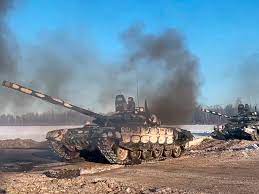This week ended on the note of nuke alert again in Ukraine-Russia war. On one hand, the leaders keep vouching by the global agenda of disarmament at various international platforms, while on the other hand, they keep flexing their nuclear weapons and capabilities.
Discussing nuclear disarmament is one pandora box. Nuclear diplomacy involves more nuclear build-up than decommissioning of the arsenals. Russia-Ukraine war depicts the same. On one hand, both the nations keep crying about the repercussions of the war, while on the other hand, no one is ready to approach the diplomatic table. Fresh attacks by Russia on Ukraine this week proved that their wish to stop the war is a lip service only at the moment. Also, Ukraine and Russia are accusing each other of bombarding in the flood-hit Kherson region after the destruction of a Russian-held dam causing flood. It seems that the world will have to wait for this positive development. US’ Secretary of Defence, Lloyd Austin travelled to India recently to reinforce the strategic partnership between India and the US, and strengthen cooperation in key areas ahead of Indian Prime Minister Modi’s official state visit to the US scheduled in the last week of June this year.
US and India Forge Strong Defense Partnership Amid Rising China Tensions
The US has already worked upon sharing technology with India for fighter jet engines and armed drones, which is a pathbreaking sign in the defence partnership between the two nations. India is working on manufacturing of jet engines based on the technology to be shared by the US. Both the nations have already been working to share technology and other real-time sensitive information under the agreements Logistics Exchange Memorandum of Agreement (LEMOA), which was signed in 2016, COMCASA (Communications Compatibility and Security Agreement) signed in 2018, and BECA (Basic Exchange and Cooperation Agreement) signed in 2020. These agreements enable sharing of sophisticated military technology, logistics and geospatial maps between the two nations. Both the nations are concerned about the Indo-Pacific region as its neutrality remains critical for the world trade as well as security. China’s increasingly aggressive behaviour in the region has put nations and various platforms on alert; and new bilateral and multilateral defence cooperation pacts can be seen.
Japan Boosts Maritime Security Focus in Response to China’s Threats
Considering the major security challenge posed by China in the region, Japan has also approved a major plan to focus on its maritime security and its national interests. Earlier also, Japan announced its remilitarization considering the threat posed by China. Now, Japan has revised its Development Cooperation Charter, which has been approved by its PM Fumio Kishida’s Cabinet to address broadening China concern and the impact of Russia-Ukraine war. Under the revised charter, Japan will now give priority to the triggered situation in Indo-Pacific region due to the aggression of China and the crises generated due to Russia-Ukraine war in the domains of food and energy security. Japan has now announced OSA (Official Security Assistance) for the developing nations in the Indo-Pacific region to provide Japan-made equipment such as radars, antennas, as well as development of infrastructure such as ports in the region. This majorly involves military cooperation to strengthen the national security of the nations in the Indo-Pacific region.
Russia-Ukraine Conflict Intensifies Amidst Nuclear Deployment Threats
While the nations in the Indo-Pacific region are uniting against any hegemony in the region, Russia and Ukraine are busy in opening new chapters in their war every day. This week, both the nations remained engaged in various attacks, nuke alerts and shelling in the flood-hit region. Shortly after Zelensky visited the southern city of Kherson, Ukraine accused Russia of striking an attack in the region. On the other hand, the Russian authorities accused Ukraine of killing two emigrants who were trying to cross the flood-hit Dnipro River. Now Russia is all set to start deploying tactical nuclear weapons in Belarus. Putin had a meeting with his Belarusian counterpart Lukashenko in Sochi, Russia, and is all ready to deploy tactical nuclear weapons by the month of July. If Russia and Belarus take this step, the war will enter into an unimaginable phase of destruction.
Wars only bring destruction. Everyone knows this. But then why wars? Involving more nations in Russia-Ukraine would lead to the world war. If analysed comprehensively, we are already facing the situation of a world war as indirectly entire NATO is involved in this deadly war. China too needs to learn a lesson from this. It is bringing NATO to Indo-Pacific, and this will not be a good situation for the neutrality of the region. Neutrality of the regions and the world matters a lot. When will the leaders realise this, remains a pertinent question.
The author is Professor, School of International Studies, JNU.







